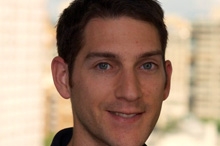

Avi Jacobson is being honored as a Veteran Advancing Clean Energy and Climate Security Champion of Change.
My career in clean energy began with silence.
The most disruptive sound on our Special Operations Task Force’s compound in Iraq was not the occasional mortar attack. It was not the controlled detonation of bombs, shells, and assorted unexploded items that were found on the old battleground that was our home. It was not the firing range or the fighter jets on full afterburner overhead.
The most disruptive sound on our secure compound was deafening silence: the sudden quiet of our diesel generator being overloaded and shutting down during the hottest part of the desert summer day. Critical communications systems were running on emergency backup batteries or not running at all. The lack of energy planning directly impacted our ability to operate.
Even when the generators ran smoothly, the reliance on diesel fuel detracted from our combat readiness. Maintaining a steady fuel supply depended on expensive airlifts and dangerous truck convoys. The dollar costs of sustaining such a complicated supply chain are high. The cost in lives of those wounded or killed on resupply missions is painful to contemplate. The burden of having to dedicate so much of our fighting force to convoy security is maddening.
Beyond power considerations, burning trash in open pits for most of the war not only subjected our troops to harmful toxins but also produced thick smoke, reducing runway visibility. This was yet another way resource management choices directly impacted the battlefield. Another was the large number of troops evacuated due to back and knee injuries from carrying heavy loads, often including batteries.
There had to be a better way and I wanted to find it.
For the military in Afghanistan and Iraq, an unconventional battlefield with no clear battlefront undermined the assumptions underlying our energy planning, as did the unexpected need to maintain and operate temporary forward operating bases for extended periods of time. And here at home, increased competition for resources as globalization lifts billions out of poverty, aging energy infrastructure, and the increasing risks of climate change are all forcing us to face the costs of our current energy system.
Through the Office of the Assistant Secretary of Defense for Operational Energy, the military is making great strides in improving energy management in deployed locations. Similarly, stateside military bases are diversifying their power sources and integrating more local renewable energy to ensure resiliency in the face of disaster.
At the Washington State Housing Finance Commission, I am working diligently to solve these society-wide problems of resource management. We have grown the Commission’s Sustainable Energy Program into a clearinghouse of information that benefits everyone from the earliest-stage Cleantech Open competitors to sophisticated Energy Services Companies. Our bond financing tools were recognized at the 2013 Better Buildings Summit as a model of public-private partnerships.
The Commission’s focus is on developing and facilitating financing models that enable clean energy technology deployment. We realize that sustainable energy requires a sustainable business model and access to capital. With a focus on the market’s demands, the Commission is driving scalable solutions for a clean energy economy.
Successes belong to your troops; failures are your own. This axiom of leadership was repeated throughout my training as an officer in the United States Air Force. It is especially poignant as I am being honored as a Veteran Advancing Clean Energy and Climate Security Champion of Change. The accomplishments for which I am being recognized – whether supporting Special Operations Forces in Iraq or facilitating the financing and deployment of clean energy projects here at home – have truly been team efforts.
Avi Jacobson is the Senior Sustainable Energy Coordinator at the Washington State Housing Finance Commission.


